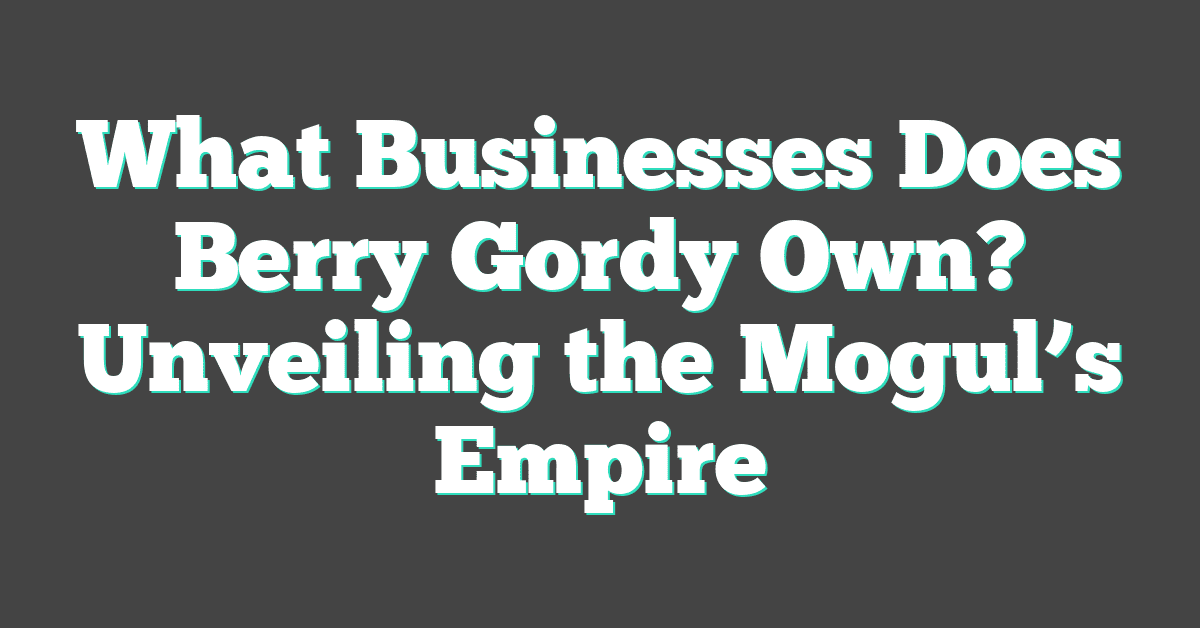Berry Gordy’s name is synonymous with the sweet sounds of Motown, but his business savvy extends far beyond the iconic music label. As a trailblazing entrepreneur, Gordy’s ventures showcase his diverse interests and influence.

From his early days pressing vinyl to his forays into film and television, Gordy’s portfolio is as varied as the artists he helped launch. Let’s dive into the empire built by this legendary mogul and explore the businesses that bear his unique fingerprint.
Motown Records: The Birth of a Music Empire
Berry Gordy’s journey into the music industry began with a visionary idea and an $800 loan. In 1959, Motown Records was launched, destined to become synonymous with a distinct sound that would transcend musical genres and generations. With a knack for identifying talent, Gordy gathered a roster of artists who would define an era in music and who, to this day, are celebrated as legends.
Under Gordy’s leadership, Motown didn’t just produce hits; it cultivated an environment where artists could thrive creatively and develop a unique sound. The label’s assembly-line approach to making music, inspired by the factories of Detroit, proved groundbreaking. Songwriters, musicians, and singers collaborated intimately, crafting chart-topping songs with an unmistakable Motown beat.
The tenacity and innovative strategies of Gordy propelled Motown Records to unparalleled success. Through the 1960s and beyond, the label churned out a series of number-one hits, shaping the soundtrack of America and influencing artists worldwide. Names like the Supremes, Stevie Wonder, and the Jackson 5 became household staples, etching the Motown name into musical legend.
The cultural impact of Motown extends beyond the music itself. The label played a pivotal role in the racial integration of popular music, breaking down barriers and bringing African American music to a broader audience. By doing so, Gordy didn’t just create a business; he spearheaded a movement that would leave an indelible mark on music and society.
Beyond the distinctive sound, Gordy’s business acumen ensured that Motown’s influence would last. He ensured artists received the mentoring they needed in areas like performance techniques and etiquette, grooming the Motown stars not just for the charts but for lifelong careers. This approach fortified the empire Gordy was building, making Motown a constant in an industry known for its fickleness.
Gordy’s Early Entrepreneurial Ventures
Before Berry Gordy became synonymous with the Motown music melodrama, he dabbled in a variety of business endeavors. His foray into entrepreneurship started modestly, giving a glimpse into the tenacity that would eventually become the cornerstone of the Motown empire.
Gordy was no stranger to the rigors of hard work and the hustle it takes to achieve success. With the same drive that would later fuel his record company, he ventured into the boxing ring as a featherweight fighter. Boxing taught Gordy lessons in discipline and dedication—traits that would serve him well in his later endeavors.
« What Businesses Does Polo G Own? Unveiling the Rapper’s Empire
What Businesses Does Diplo Own? Unveiling His Empire Beyond Music »
After his brief stint as a pugilist, Gordy explored the business side of entertainment. He opened the 3-D Record Mart, a store specializing in jazz music in Detroit. Though the store was short-lived, the experience was far from a loss. It provided Gordy with his first taste of the music industry’s retail aspect and a crash course in consumer preferences.
Concurrently, Gordy began to demonstrate his knack for songwriting. He penned songs for local Detroit artists, adding another layer to his understanding of the music business. One of his compositions, “Reet Petite,” became a hit for Jackie Wilson, showcasing Gordy’s potential as a songwriter and producer.
By diversifying his interests and always keeping an eye out for the next opportunity, Gordy was sewing the seeds of his future success. Each venture, no more than a stepping stone at the time, was crafting the business savant that would usher in a musical revolution and leave an indelible mark on the entertainment industry. With these experiences under his belt, Gordy was gearing up for his most significant undertaking—the formation of Motown Records. This next step would take his understanding of business, artistry, and production and amalgamate them into a cultural phenomenon.
From Hitsville USA to Hollywood: Gordy’s Film and TV Ventures
Berry Gordy’s leap from record mogul to media impresario wasn’t just a step—it was a soaring leap. After pioneering the sound of young America with Motown Records, Gordy set his sights on the shiny allure of Hollywood. He knew the stories of his artists and their music were cinematic gold, and he was right.
In 1972, Gordy’s foray into filmmaking erupted with the cult classic “Lady Sings the Blues,” featuring Diana Ross in her Oscar-nominated portrayal of Billie Holiday. The film was not only a box office success but also a critical triumph, cementing Gordy’s reputation as an entertainment visionary. His grasp of talent transition beyond music; he had an eye for stirring performances that translated magnificently on screen.
Motown Productions was Gordy’s vehicle to drive his film and television aspirations. It produced a succession of television specials and shows that brought Motown’s beloved songs and artists to a visually captivated audience. These specials often included star-studded performances that lit up living rooms across the nation, bringing the infectious Motown sound to an even wider audience.
Another hit, “Mahogany,” also starring Diana Ross, underscored Gordy’s knack for combining heart-stirring narratives with unforgettable music. It further showcased Motown’s ability to cross over from producing records to creating memorable film soundtracks.
His television productions included a variety show titled “The Jacksons” and the memorable “Motown 25: Yesterday, Today, Forever” special, which introduced Michael Jackson’s moonwalk to the world—a moment in pop culture history that’s etched in the minds of millions.
Gordy’s ventures were not only astute business moves; they also translated the essence of the Motown experience into visual and narrative formats that resonated deeply with viewers. Riding high on these successes, Berry Gordy continued to move forward, bringing the Motown magic to every medium he touched.
Gordy’s Influence on Broadway: Motown The Musical
Berry Gordy’s impact isn’t limited to screens big and small. The iconic music mogul also stamped his mark on the illustrious Broadway scene with “Motown: The Musical.” This production is more than a mere musical; it’s a living testament to Gordy’s remarkable journey and the music that defined a generation.
As the brainchild behind the show, Gordy wrote the book for the musical, ensuring that his vision for Motown’s story was authentically represented on stage. “Motown: The Musical” became a sensation, praised for bringing the record label’s storied history to life.
Critics and audiences alike were captivated by the musical’s colorful journey through Gordy’s life, traversing the inception of Motown to its rise as a musical empire. The show weaves together a rich tapestry of sounds with classic hits from the likes of Diana Ross, Marvin Gaye, and the Jackson 5, among others. It’s more than entertainment; it’s a vibrant history lesson wrapped in the velvety vocals and slick dance moves characteristic of the era.
The Broadway production didn’t just resonate with those who lived through the Motown period. It introduced a new generation to the music that changed America, cementing the label’s influence across yet another facet of the entertainment industry.
Berry Gordy’s foresight to chronicle the story of Motown in a Broadway musical format did not just pay homage to its legacy but also secured its perpetual presence in American culture. In showcasing excellent performances and breathtaking storytelling, Gordy managed to create a space where the spirit of Motown could thrive anew.
Tickets flew out of box offices, a signal that Gordy had, once again, identified a golden opportunity in marrying music with narrative. “Motown: The Musical” continues to tour, tantalizing fans worldwide and ensuring that the Motown sound remains a beloved jewel on the Great White Way.
The Legacy Continues: Businesses Carrying Gordy’s Torch
Berry Gordy’s influence extends beyond the golden era of Motown, as modern businesses continue to embody the spirit of his legacy. These ventures bear the marks of Gordy’s entrepreneurial savvy and commitment to innovation.
One such business is the contemporary incarnation of Motown Records, now part of the Capitol Music Group. The label keeps Gordy’s principles alive by developing fresh talent with the same attention to artistry that characterized Motown’s earlier days. They’re not just selling records; they’re creating the soundtrack of a new generation.
Gordy’s touch is also evident in the visual arts sector, particularly through his investment in a variety of production companies. These businesses pay homage to Gordy’s cinematic ventures by blending storytelling with rich musical scores. They explore diverse narratives while maintaining the high standards of entertainment Gordy always demanded.
The mogul’s foray into theater has inspired similar endeavors. His success with “Motown: The Musical” sparked a trend of music tycoons translating their creative legacies onto the Broadway stage. Such productions continue to dazzle audiences, drawing on Gordy’s template of coupling iconic songs with gripping life stories.
Additionally, Gordy’s approach to brand management has influenced numerous entrepreneurs in the entertainment industry. They recognize the importance of not just creating a product, but nurturing a lasting brand identity as Gordy did with Motown. These business leaders understand that to thrive, they must connect with audiences on a deeper, nearly personal level, reminiscent of Gordy’s strategy with Motown’s fanbase.
Through these varied enterprises, the essence of Gordy’s vision lives on. His entrepreneurial spirit encourages today’s business owners to push boundaries and, like Gordy, they’re constantly seeking new avenues to leave an indelible mark on culture and society.
Conclusion
Berry Gordy’s impressive portfolio showcases his knack for innovation and his lasting impact on the entertainment industry. From music to film and theater his ventures have not only paved the way for new talent but have also set a precedent for brand engagement. His entrepreneurial journey reflects a commitment to cultural influence and a legacy that extends far beyond Motown’s original hits. Gordy’s story is a testament to the power of visionary leadership in shaping the arts and inspiring future generations.
Frequently Asked Questions
Who is Berry Gordy?
Berry Gordy is the founder of Motown Records, an iconic music label that shaped the sound of a generation and fostered the careers of numerous legendary artists.
What industries did Berry Gordy venture into beyond music?
Beyond music, Berry Gordy expanded his ventures into film, television, and other business sectors, including production companies and theatrical productions.
Has Motown Records remained relevant in contemporary music?
Yes, Motown Records continues to evolve, developing fresh talent and producing music that resonates with the new generation.
What has Berry Gordy done in the realm of musical theatre?
Berry Gordy has successfully ventured into musical theater, notably with “Motown: The Musical,” which celebrates the history of Motown Records and its impact on American culture.
How has Berry Gordy influenced entrepreneurs in the entertainment industry?
Berry Gordy’s approach to brand management and deep audience connection has become a model for entrepreneurs in the entertainment industry seeking to build long-lasting and influential brands.
















